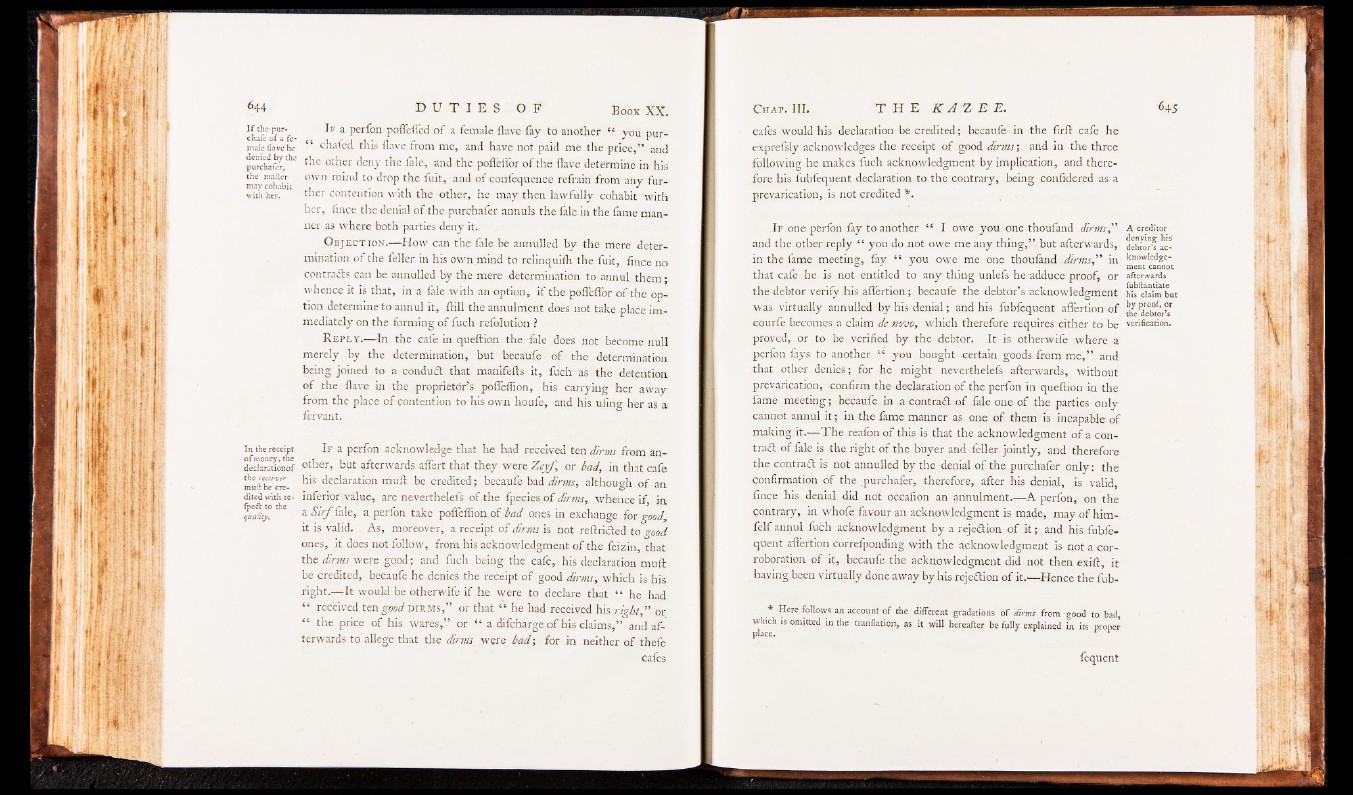
I f the-pur-
chafe of a female
ilave be
denied by the
purchafer,
the mailer
may cohabit
with herl
In the receipt
o f money, the
declarationof
the receiver
mu ft be credited
with re-
Ipeft to the
quality.
If a perfon poflèflèd of a female Have fay to another you pur-
“ chafed this flave from me, and have not paid me the price,” and
the other deny the fale, and the poflèflbr of the flave determine in his
own mind to drop the fuit, and of confequence refrain from any further
contention with the other, he may then lawfully cohabit with
her, fince the denial of the purchafer annuls the fale in the fame manner
as where both parties deny it.
O b j e c t io n .— How can the fale be annulled by the mere determination
of the feller in his own mind to relinquifh the fuit, fince no
contrails can .be annulled by the mere determination to annul them;
whence it is that, in a fale with an option, if the poflèflbr of the option
determine to annul it, ftill the annulment does not take place immediately
on the forming of fuch refolution ?
R e p l y .— In the cafe in queftion the, fale does, not become null
merely by the determination, but beeaufe of the determination
being joined to a conduit that manifefts it, fuch as the detention
of the flave in the proprietor’s poflèflion, his carrying her away:
from the place of contention to his own houfe, and his ufin°- her as a
fervant.
If a perfon acknowledge that he had received ten dirms from another,
but afterwards affert that they were Z ey f or bad, in that cafe
his declaration muft be credited; beeaufe bad dirms, although of an
inferior- value, are neverthelefs of the fpeeies of dirms, whence if in
a Sirfi&le, a perfon take poflèflion of bad ones in exchange for good,
it is valid. As, moreover, a receipt of dirms is not reftridled to good
ones, it does not follow, from his acknowledgment of the feizin that
the dirms were good; and fuch being the cafe, his declaration muft
be credited, beeaufe he denies the receipt of good dirms, which is his
right.— It would be otherwife if he were to declare that “ he had
‘ ‘ received ten good d ir m s , ” or that “ he had received his right", .or
“ the price of his wares,” or “ a difeharge of his claims,” and afterwards
to allege that the dirms _ were bad; for in neither of thefe
cafes
cafes would his declaration be credited ; beeaufe in the firft cafe he
exprefsly acknowledges the receipt of good dirms; and in the three
following he makes fuch acknowledgment by implication, and therefore
his fubfequent declaration to the contrary, being confidered as a
prevarication, is not credited *.
If one perfon lay to another “ I owe you one thoufand dirms"
and the other .reply “ you do not owe me any thing,” , but afterwards,
in the lame meeting, fay “ you owe me one thouland dirms " in
that cafe he is not entitled to any thing unlefs he adduce proof, or
the debtor verify his aflertion; beeaufe the debtor’s acknowledgment -
was virtually annulled by his denial; and his fubfequent aflertion of
courfe becomes a claim de. novo, which therefore requires either to be
proved, or to be; verified by the debtor. It is otherwife where a
perfon fays ;to another “ you bought certain goods from me,” and
that other denies; for he might neverthelefs afterwards, without
prevarication, confirm the declaration of the perfon in queftion in the
lame meeting; beeaufe in a contrail of fale one of the parties only
cannot annul it; in the fame manner as one of them is incapable of
making it.— The realbn of this is that the acknowledgment of a contrail
Of fale is the right of the buyer and Teller jointly, and therefore
the contrail is not annulled by the denial of the purchafer only: the
confirmation o f the purchafer, therefore, after his denial, is valid,
fince his. denial did not occalion an annulment.— A perfon,- on the
contrary, in whofe favour an acknowledgment is made, may of him-
felf anpul fuch acknowledgment by a rejeition of i t ; and his fubfequent
aflertion correfponding with the acknowledgment is not a corroboration
of it, beeaufe the acknowledgment did not then exift, it
haying been virtually done away by his rejeilion of it.— Hence the fub-
* Here follows an account o f the different gradations o f dirms from good to bad,
which is omitted in the tranflation, as it will hereafter be fully explained in its proper
place. t
A creditor
denying his
debtor’s acknowledgement
cannot
afterwards
fubftantiate
his claim but
by proof, or
the debtor’s
verification.
fequent